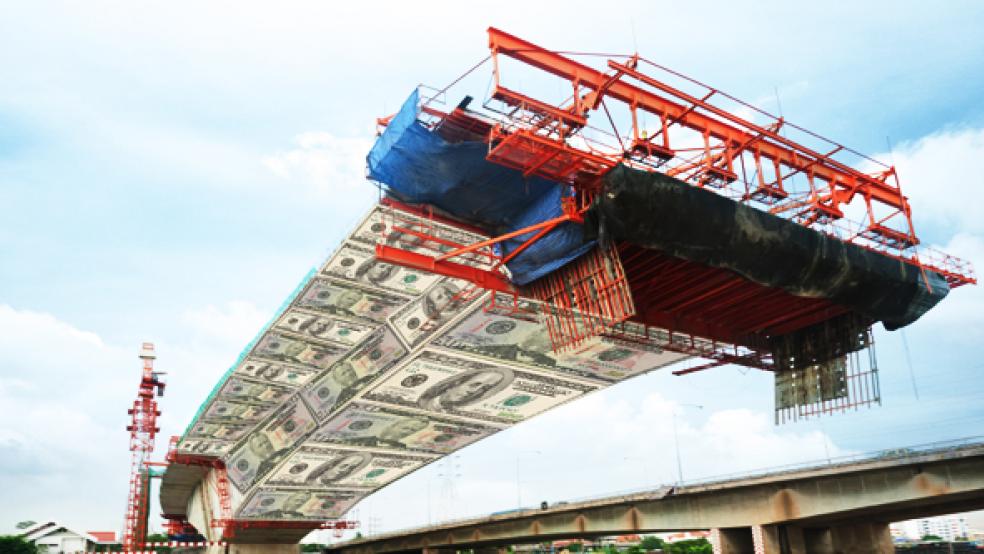Although President Biden’s push for a bipartisan infrastructure agreement took a hit this week as Republicans blocked a procedural vote to advance the effort, White House and Senate negotiators say they are making progress as talks continue and are optimistic that a deal is just around the corner. Several senators said Thursday that they expect to have an agreement early next week.
“I think it’ll be there on Monday,” Sen. Mitt Romney (R-UT) told Bloomberg News, referring to the bill’s text and budget score. “If not, not. So it’ll be a day or two after -- but I think it’ll be on Monday.”
Sen. Joe Manchin (D-WV) said the bill is very near complete, including the contentious issue of revenues. “We had an agreement on 99% when we walked out yesterday afternoon,” he told Bloomberg. “The pay-fors are pretty much lined up.”
Given the steady progress, Biden’s long-running obsession with forging a bipartisan deal on infrastructure “suddenly looks quite doable,” Politico said.
But failure is still an option: Although negotiators say they’re close to an agreement, there are still some important details that need to be nailed down.
Sens. Tom Carper (D-DE) and Tammy Duckworth (D-IL) said Thursday that they would not support the infrastructure plan unless it includes more funding for water and sanitation. “While I voted to proceed to consideration of a bipartisan infrastructure bill, more will need to be done in order for me to support the current proposal that is being drafted,” Duckworth said. “I can’t commit to supporting a final bill if it does not include full funding for my Drinking Water and Wastewater Infrastructure Act (DWWIA) at $35.9 billion over the next five years.”
Other Democrats, including Sens. Chris Murphy and Richard Blumenthal of Connecticut, said they were looking for more money for high-speed rail.
On the revenue side, negotiators have reportedly agreed to delay a Trump-era rule that eliminates drug rebates for benefits managers in Medicare Part D, for a projected saving of about $177 billion over 10 years. However, details won’t be released until next week, and drug industry lobbyists are already lining up to oppose the move.
A giant Plan B: Even as negotiations on the bipartisan plan continue, with relatively high expectations that they will succeed, some Democratic lawmakers are making plans for how to proceed if things fall apart.
One option would be to add the nearly $600 billion in new spending from the bipartisan bill to the $3.5 trillion outlined in Democrat’s budget blueprint, creating a $4.1 trillion package that includes all of President Biden’s “hard” and “soft” infrastructure priorities.
Sen. Tim Kaine (D-VA), who sits on the Budget Committee, told Politico that he was looking into that possibility: “if for some reason the bipartisan version doesn’t work out, then we ought to be looking at a reconciliation bill that’s at $4.1 trillion,” he said.
Kaine said the larger number makes sense, since it’s clear that’s how much Democrats plan to spend overall. “The reconciliation instruction is ‘spend up to this number,’” Kaine told Axios. “We do look at the two bills as a combined investment, totaling about $4.1 trillion.”
Sen. Bernie Sanders said he agreed with that approach. “At the end of the day ... the $600 billion in physical infrastructure, you can do it in the bipartisan bill, or you can combine it with one bill,” he told Politico. “One way or another, it’s going to happen.”
But the massive spending total could give some moderate Democrats second thoughts, especially in the House.
“Heck, no,” Rep. Kurt Schrader (D-OR) told Politico when asked about the possibility of a larger package. “We can’t afford to keep spending money we don’t have.”
Rep. Josh Gottheimer (D-NJ), an influential moderate, said he would want to look at the details, but also said the $4.1 trillion figure is “aggressive.”
Still, should the bipartisan deal fall through, some Democrats will push for the combined package, arguing that it all boils down to the same thing. “I don’t know why they’d change their mind on infrastructure spending depending on the vehicle through which it’s accomplished,” Sen. Sheldon Whitehouse (D-RI) told Politico. “That wouldn’t be a very logical position in my view.”




